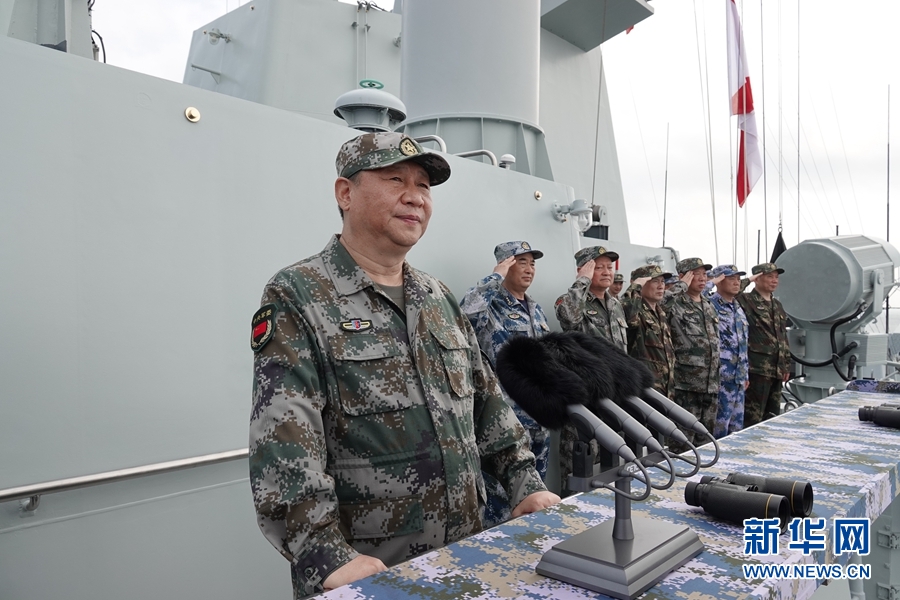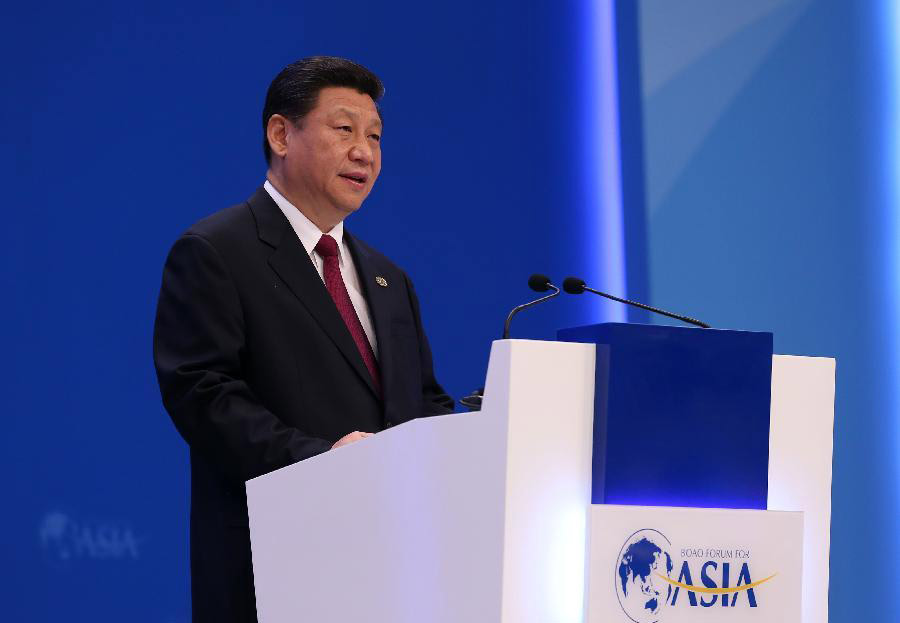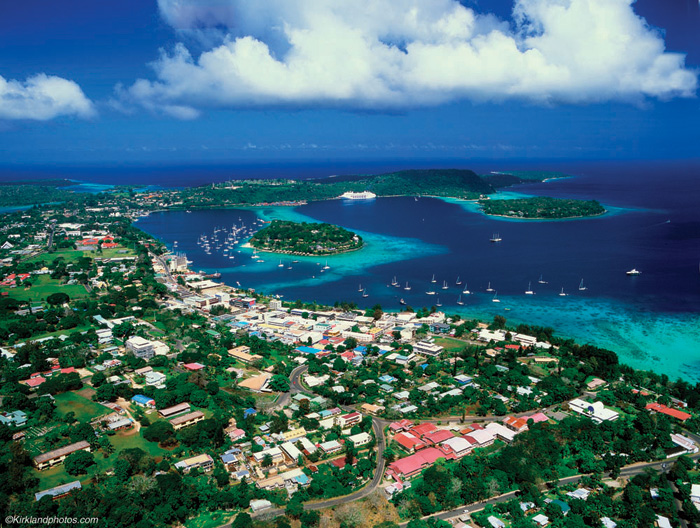
 President Xi Reviews the PLA Navy
President Xi Reviews the PLA NavyOn Thursday, President Xi attended the largest navy review since the foundation of the People's Republic of China in 1949. It took place off the coast of Hainan in the South China Sea, close to the location of the Boao Forum. Forty-eight warships, 76 aircraft and more than 10,000 sailors and soldiers took part, according to the Global Times. On board the destroyer Changsha, President Xi made a speech calling for the PLA Navy to promote technological innovation, strengthen the navy's capabilities in diverse forms of military combat and "implement the fundamental principle. . .of the Party's absolute leadership." He also observed J-15 fighter jets taking off from China's only operating aircraft carrier, the Liaoning.
In addition to the naval review, live-fire drills are set to be conducted in the Taiwan Straits on April 18, China's Fujian Maritime Safety Administration announced. After months of increasing tensions between the U.S. and China over Taiwan, including the signing into law of the Taiwan Travel Act by President Trump and recent visits by U.S. officials to the island, the naval exercises could be interpreted as a message of strength directed at the United States and Taiwan. Just this week, the U.S. Department of State authorized American defense companies to market submarine technology to Taiwan, which will allow Taiwan to upgrade its self-defense capabilities in an area where it lacks the advanced technology of China and the United States.
President Xi's rhetoric on Taiwan has become increasingly firm in recent months. During the "Two Sessions," he said that those seeking independence for Taiwan would face the "punishment of history." And on the sidelines of the Boao Forum, Xi urged a delegation of Taiwanese businessmen to "firmly maintain the '1992 consensus'" and oppose independence. In response to China's huge naval exercises this week, Taiwan's defense ministry asked its citizens to remain "at ease," as the exercises were a "scheduled annual drill."
In an article for China-US Focus, Steven Stashwick wrote that Chinese military drills, including one involving nearly the entire PLA Navy Marine force last month, "worry the United States and others in the region who see China's buildups in the South China Sea as threatening to their own territory or claims." Responding to the concerns of regional neighbors, Admiral Wu Shengli, the former chief of the PLA Navy, maintained in past conversations with U.S. officials that China's build-ups in the South China Sea were "defensive," not signs of aggression.
Despite China's displays of military power, U.S. defense commentators have maintained that the country still has a significant way to go with its program of military modernization and focus on high-tech capabilities. James Nolt, writing for China-US Focus last week, argued that China's navy is "now second only to the United States. Yet it is still far behind, especially considering America's worldwide network of bases and how many of the second-tier naval powers are its formal allies."
 Reactions to President Xi's Reforms in the United States
Reactions to President Xi's Reforms in the United StatesPresident Xi, in a speech on Tuesday at the Boao Forum, announced a number of reform measures for China's economy, including lowering automobile tariffs, easing foreign equity restrictions in the insurance sector and strengthening the protection of intellectual property rights. Despite the lack of substantially new policies on reform in the speech, it was received well by the Trump administration. The president tweeted that he was "very thankful for President Xi of China's kind words on tariffs and automobile barriers. . .We will make great progress together!"
Some U.S. officials interpreted Xi's reform measures as a concession to the United States, a positive result of the Trump administration's standoff with China on trade. Larry Kudlow, the White House chief economic adviser, argued that Trump's threats of additional tariffs were working and that President Xi had "blinked." This interpretation was swiftly rebuked by Chinese officials. The Chinese commerce ministry's spokesman, Gao Feng, said at a press briefing that the measures were part of China's ongoing reform process and had "nothing to do with the trade disputes with the U.S." On Wednesday, the new governor of the People's Bank of China, Yi Gang, provided more detail on the reforms. He said that China would allow foreign financial companies to compete on an equal footing with Chinese companies, and confirmed that China seeks to launch a trading link between its stock markets and London, by the end of 2018.
The reform measures mentioned this week met with mixed reactions from prominent businessmen in the United States. Elon Musk, the founder of the auto-manufacturer Tesla, tweeted that President Xi's reforms (which included China's plans to lower import tariffs for vehicles) were "a very important action by China. Avoiding a trade war will benefit all countries." However, prominent investor Jim Chanos argued that American optimism over opportunities in China's market was misplaced. "It seems that everybody loves the Chinese market," he said to CNN on Wednesday. "But nobody ever makes any money there."
 Vanuatu, Caught Between China and Australia Over Military Base Rumors
Vanuatu, Caught Between China and Australia Over Military Base Rumors1,500 miles off the coast of Australia, the tiny island nation of Vanuatu found itself in the midst of tensions between China and Australia this week. On Monday, Australia's Fairfax Media published a report claiming that the governments of China and Vanuatu had held initial discussions on the possibility of the Chinese military establishing an outpost on the island — right in Australia's backyard. Currently China has only one overseas military base, in Djibouti.
Officials from both nations denied the report; a Chinese embassy official called the news "ridiculous." However, these stark denials have not suppressed concern over China's moves in the South Pacific, particularly amongst Australians. In December of last year, Australian Prime Minister Malcolm Turnbull introduced new laws preventing foreigners from donating to political campaigns. He vowed to "stand up" for the Australian people against what he characterized as China's meddling in domestic Australian politics. Chinese Foreign Ministry spokesman Geng Shuang said Turnbull's comments were "without principle and full of bias against China."
No formal proposals on a military base have been put to the Vanuatu government, but considering China's history of development assistance to Vanuatu, the possibility of a Chinese base there is not far-fetched. Vanuatu has received hundreds of millions of dollars in loans and grants from the Chinese government to fund infrastructure projects such as the Luganville wharf, a Beijing-funded infrastructure project on Vanuatu which was built for large shipping vessels, but has the potential to service naval vessels as well. China reportedly accounts for nearly half of Vanuatu's $440 million foreign debt. Speaking to the The Sydney Morning Herald, a former advisor to former U.S. Secretary of State John Kerry, Charles Edel said, "Chinese presence in Vanuatu, while today about fishing access and commercial trade, tomorrow could represent a threat to Australia's northern approaches."
Responding to reports this week, Australia's foreign minister, Julie Bishop, said, "Vanuatu is a sovereign nation and its foreign and defence relations are a matter for Vanuatu. But. . .I remain confident that Australia is Vanuatu's strategic partner of choice."
 Quick Focus: Will the Kim-Trump summit ever happen?
Quick Focus: Will the Kim-Trump summit ever happen?Will the Kim-Trump summit ever happen? Could the summit succeed? We put this question to seven academics from the United States and China, as part of our new conversation platform, Quick Focus, which will feature short responses to contentious questions by our network of scholars.
"North Korea wants to make itself a de-facto nuclear armed country, and President Trump wants to break it. Thing could go wrong very easily. Both sides should buckle up and drive safe," wrote Fan Jishe of the Chinese Academy of Social Sciences.
Richard Weitz, a senior fellow of the Washington D.C. based Hudson Institute, argued, "In all likelihood, Pyongyang will focus on pocketing propaganda gains— showing domestic and foreign audiences that Trump will meet Kim despite his defiance— while demanding major U.S. and South Korean military, economic, and diplomatic concessions."
In her response, North Korea analyst Maria Rosaria Coduti argued that the real question in anticipation of the summit is: is the Trump administration "ready"?
Read the rest of the responses on the new Quick Focus platform.
Prepared by China-US Focus editorial teams in Hong Kong and New York, this weekly newsletter offers you snap shots of latest trends and developments emerging from China every week, while adding a dose of historical perspective.
- 2018-04-06 China and Russia Pledge Military Cooperation in a Signal to the United States
- 2018-03-30 Kim Jong Un Visits Beijing on First Overseas Visit
- 2018-03-23 President Trump Asks for Tariffs on Around $50 Billion Worth of Chinese Imports
- 2018-03-16 Tillerson to be Replaced by Mike Pompeo as Secretary of State
- 2018-03-09 President Trump Agrees to Meet Kim Jong-Un
- 2018-03-02 U.S. Imposes Tariffs on Chinese Aluminum
- 2018-02-23 A Week of Developments Related to North Korea
- 2018-02-16 Cui Tiankai says U.S. Should Not Advocate Confrontational Strategy Towards China
- 2018-02-09 China Releases the “No.1 Central Document” Containing New Rural Policies
- 2018-02-02 Wang Qishan Appointed to the National Legislature
- 2018-01-26 New Edition of the Focus Digest
- 2018-01-19 South Korea and North Korea to Compete Together at the Winter Olympics
- 2018-01-12 U.S. House of Representatives Passes Taiwan Bills
- 2018-01-05 U.S. Rejects Sale of Moneygram to China’s Ant Financial
- 2017-12-22 Trump’s National Security Strategy Labels China a “Revisionist Power”
- 2017-12-15 White House and Secretary of State contradict each other on North Korea talks
- 2017-12-08 China Boasts its Technology Chops at the 4th Annual World Internet Conference
- 2017-12-01 The Future of the China-US Economic Relationship
- 2017-11-17 The “Indo Pacific”: A New American Strategy for Asia?